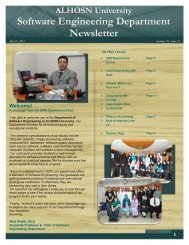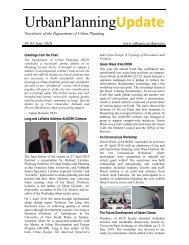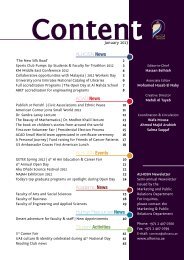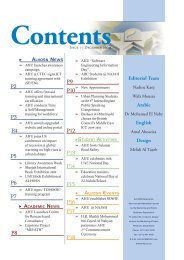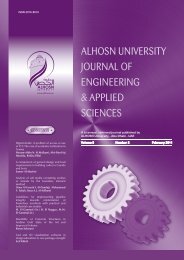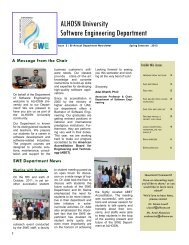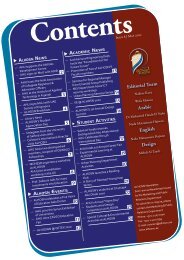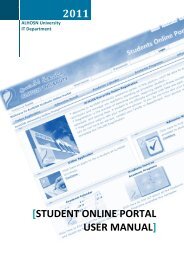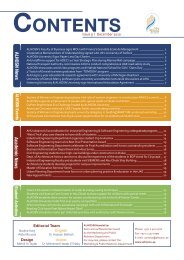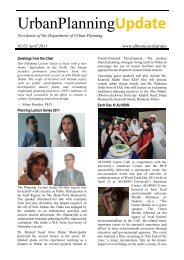ALHOSN University Catalogue Global Knowledge with Local Vision ...
ALHOSN University Catalogue Global Knowledge with Local Vision ...
ALHOSN University Catalogue Global Knowledge with Local Vision ...
You also want an ePaper? Increase the reach of your titles
YUMPU automatically turns print PDFs into web optimized ePapers that Google loves.
SWE 362 Software Design and Architecture (3 = 3 + 0)<br />
Prerequisite: SWE 265<br />
The course discusses the analysis, selection, and evaluation of an appropriate architecture; architectural tactics and<br />
architectural patterns; documenting a software architecture; identifying and scheduling architectural releases;<br />
identifying constraints on and enablers for architectural decisions; and analyzing architectural trade-offs.<br />
SWE 421 Software Engineering Requirements and Specifications (3 = 3 + 0)<br />
Prerequisites: SWE 265, FES 204<br />
Combines a range of topics integral to the design, implementation, and testing of a medium-scale software<br />
system <strong>with</strong> the practical experience of implementing such a project as a member of a programming team.<br />
Introduces formal methods, requirements engineering, specifications, software life cycle models.<br />
SWE 425 Software Testing and Measurement (3 = 3 + 0)<br />
Prerequisite: SWE 362<br />
This course is concerned <strong>with</strong> the principles underlying the development of software that needs to meet<br />
specific external goals, where these goals need to be expressible in measurable terms. It covers the principles of<br />
software measurement, and the ways in which they are used in planning software projects, and in monitoring how<br />
well projects are being carried out. It also examines the methods used for software testing and discusses the<br />
application of software measurement techniques to these testing methods.<br />
SWE 426 Software Quality Control (3 = 3 + 0)<br />
Prerequisite: SWE 362<br />
The students will learn how to choose appropriate quality goals and select, plan, and execute quality assurance<br />
activities throughout development, evolution and testing to predictably meet quality and schedule goals. They<br />
will learn how quality assurance can be incorporated into process improvement feedback loops that amplify the<br />
ability of an organization to cost- effectively prevent and detect faults.<br />
SWE 498, SWE 499 Capstone Project-1 and 2 (3 = 3 + 0)<br />
Prerequisite: 4th Year standing in Faculty<br />
The student is required to pursue an independent group project under the supervision of a faculty member, to<br />
prepare a written report and present a seminar describing the work. This is a 2-semester course.<br />
Technical Electives<br />
CSC 455 Computer Graphics (3 = 3 + 0)<br />
Prerequisite: 4th Year standing in Faculty The fundamental algorithms and data structures used in generative<br />
computer graphics. Topics discussed include structure of interactive graphics programs, raster algorithms, color,<br />
two-dimensional and three-dimensional geometric transformations, animation, parallel and perspective<br />
projection, hidden line and hidden surface algorithms, cubic curves and surfaces, and shading models.<br />
Students will use high resolution raster display workstations, and other graphical devices.<br />
CSC 456 Advanced Programming (3 = 3 + 0)<br />
Prerequisite: 4th Year standing in Faculty<br />
This course is designed to introduce students to the advanced concepts in application development. Topics include:<br />
system level programming, multithreading and multiprocessing, network programming, advanced web<br />
programming, and enterprise computing.<br />
CSC 460 Programming Languages and Compilers (3 = 3 + 0)<br />
Prerequisite: 4th Year standing in Faculty<br />
The core requirement for the course is the construction of a compiler for a simple but nontrivial language of the<br />
ALGOL family <strong>with</strong> nested scope and heap-allocated records, supplemented by written exercises, and exams.<br />
Important techniques such as: abstract syntax trees to avoid dangling syntax <strong>with</strong> semantics, separation of<br />
instruction selection from register allocation, sophisticated copy propagation to allow greater flexibility to earlier<br />
phases of the compiler, and careful containment of target-machine dependencies to one module. Some additional<br />
concepts to be covered include: garbage collection, compilation of object-oriented and functional languages,<br />
dataflow analysis, loop optimizations, parser error recovery, code-generator generators, byte-code interpreters,<br />
static single- assignment form, instruction scheduling and software pipelining, parallelization techniques, and<br />
cache-locality optimizations such as pre-fetching, blocking, instruction-cache layout, and branch prediction.<br />
CSC 461 Object Oriented Programming and C++ (3 = 2 + 1)<br />
139




